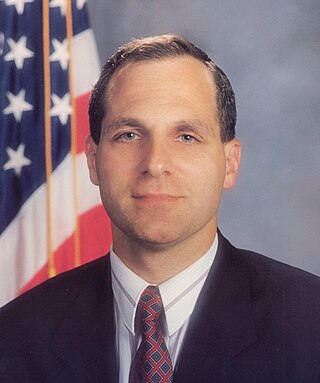Related Research Articles

Janet Wood Reno was an American lawyer and public official who served as the first female and 78th United States attorney general. Reno,a member of the Democratic Party,held the position from 1993 to 2001,making her the second-longest serving attorney general,behind only William Wirt.

Vincent Walker Foster Jr. was an American attorney who served as deputy White House counsel during the first six months of the Clinton administration.

Kenneth Winston Starr was an American lawyer and judge who as independent counsel authored the Starr Report,which served as the basis of the impeachment of Bill Clinton. He headed an investigation of members of the Clinton administration,known as the Whitewater controversy,from 1994 to 1998. Starr previously served as a federal appellate judge on the U.S. Court of Appeals for the District of Columbia Circuit from 1983 to 1989 and as the U.S. solicitor general from 1989 to 1993 during the presidency of George H. W. Bush.
The Whitewater controversy,Whitewater scandal,Whitewatergate,or simply Whitewater,was an American political controversy during the 1990s. It began with an investigation into the real estate investments of Bill and Hillary Clinton and their associates,Jim and Susan McDougal,in the Whitewater Development Corporation. This failed business venture was incorporated in 1979 with the purpose of developing vacation properties on land along the White River near Flippin,Arkansas.
In the United States,a special counsel is a lawyer appointed to investigate,and potentially prosecute,a particular case of suspected wrongdoing for which a conflict of interest exists for the usual prosecuting authority. Other jurisdictions have similar systems. For example,the investigation of an allegation against a sitting president or attorney general might be handled by a special prosecutor rather than by an ordinary prosecutor who would otherwise be in the position of investigating his or her own superior. Special prosecutors also have handled investigations into those connected to the government but not in a position of direct authority over the Justice Department's prosecutors,such as cabinet secretaries or election campaigns.

Linda Rose Tripp was an American civil servant who played a prominent role in the Clinton–Lewinsky scandal of 1998. Tripp's action in illegally and secretly recording Monica Lewinsky's confidential phone calls about her relationship with President Bill Clinton caused a sensation with their links to the earlier Clinton v. Jones lawsuit and with the disclosing of intimate details. Tripp claimed that her motives were purely patriotic,and she avoided a wiretap charge by agreeing to hand over the tapes.
The White House FBI files controversy of the Clinton Administration,often referred to as Filegate,arose in June 1996 around improper access in 1993 and 1994 to FBI security-clearance documents. Craig Livingstone,director of the White House's Office of Personnel Security,improperly requested,and received from the FBI,background reports concerning several hundred individuals without asking permission. The revelations provoked a strong political and press reaction because many of the files covered White House employees from previous Republican administrations,including top presidential advisors. Under criticism,Livingstone resigned from his position. Allegations were made that senior White House figures,including First Lady Hillary Rodham Clinton,may have requested and read the files for political purposes,and that the First Lady had authorized the hiring of the underqualified Livingstone.

Bill Clinton,the 42nd president of the United States,was impeached by the United States House of Representatives of the 105th United States Congress on December 19,1998,for "high crimes and misdemeanors". The House adopted two articles of impeachment against Clinton,with the specific charges against Clinton being lying under oath and obstruction of justice. Two other articles had been considered but were rejected by the House vote.
Webster Lee "Webb" Hubbell is a former United States Associate Attorney General from 1993 to 1994 who as part of the Whitewater controversy pled guilty to one count of wire fraud and one count of failing to disclose a conflict of interest,and was sentenced to 21 months in prison.
The White House travel office controversy,sometimes referred to as Travelgate,was the first major ethics controversy of the Clinton administration. It began in May 1993,when seven employees of the White House Travel Office were fired. This action was unusual because executive-branch employees typically remain in their posts for many years.

Michael Chertoff is an American attorney who was the second United States Secretary of Homeland Security to serve under President George W. Bush. Chertoff also served for one additional day under President Barack Obama. He was the co-author of the USA PATRIOT Act. Chertoff previously served as a United States circuit judge of the United States Court of Appeals for the Third Circuit,as a federal prosecutor,and as Assistant U.S. Attorney General. He succeeded Tom Ridge as U.S. Secretary of Homeland Security on February 15,2005.
Bernard William Nussbaum was an American attorney,best known for having served as White House Counsel under President Bill Clinton.
Robert William Ray is an American lawyer. As the successor to Ken Starr as the head of the Office of the Independent Counsel he investigated and issued the final reports on the Whitewater controversy,the White House travel office controversy,and the White House FBI files controversy. Before that he was Deputy Independent Counsel investigating former Secretary of Agriculture Mike Espy and before that Assistant United States Attorney for the Southern District of New York.
The Office of Special Counsel was an office of the United States Department of Justice established by provisions in the Ethics in Government Act that expired in 1999. The provisions were replaced by Department of Justice regulation 28 CFR Part 600,which created the successor office of special counsel. The current regulations were drafted by former acting solicitor general Neal Katyal.
Deputy White House counsel Vince Foster was found dead in Fort Marcy Park off the George Washington Parkway in Virginia,outside Washington,D.C.,on July 20,1993. His death was ruled a suicide by five official investigations.
Castle Grande was a real estate development in Arkansas about 10 miles south of Little Rock. It came into National news as a result of the Whitewater investigations. The project was a 1,050-acre (4.2 km2) lot where Jim McDougal hoped to build a microbrewery,shopping center,a trailer park and other future projects in 1985. The land was scrub pine forest that had failed already as an industrial development. The sales price was $1.75 million. State regulations prohibited Jim McDougal from investing more than 6% of his Madison Guaranty S&L assets. So,he put in $600,000 of Madison money and then for the difference had Seth Ward put in the remaining $1.15 million. This money Ward borrowed from Madison Guaranty on non-recourse,no personal obligation to repay. If federal regulators found out,McDougal's S&L could be shut down,since it had already been operating under orders to correct its lending practices.

Gregory Bestor Craig is an American lawyer and former White House Counsel under President Barack Obama,from 2009 to 2010. A former attorney at the Washington,D.C. law firm of Williams &Connolly,Craig has represented numerous high-profile clients. Prior to becoming White House Counsel,he served as assistant to the President and special counsel in the White House of President Bill Clinton,where he directed the team defending Clinton against impeachment. Craig also served as a senior advisor to Senator Edward Kennedy and to Secretary of State Madeleine Albright.

Louis Joseph Freeh is an American attorney and former judge who served as the fifth Director of the Federal Bureau of Investigation from September 1993 to June 2001.
James Foster Neal was an American trial lawyer who was best known for prosecuting labor leader Jimmy Hoffa and later top Nixon administration officials in connection with the Watergate scandal.
Solomon Louis Wisenberg is an American lawyer,legal analyst,and former Chief of the Financial Institution Fraud Unit in the U.S. Attorney's Office for the Western District of Texas. From 1997 to 1999,he served as Associate and Deputy Independent Counsel under Kenneth W. Starr during the Whitewater Investigation &Clinton-Lewinsky Investigations. Wisenberg was a frequent commentator on legal issues related to the investigation of Donald Trump's presidential campaign by Special Counsel Robert Mueller that resulted in a finding of insufficient evidence of a criminal conspiracy.
References
- ↑ Labaton, Stephen (1994-01-21). "Man in the News; Aggressive Prosecutor: Robert Bishop Fiske Jr". The New York Times. ISSN 0362-4331 . Retrieved 2023-04-14.
- ↑ Whitewater tmeline The Washington Post , official website. (1998) Retrieved December 13, 2010
- ↑ "'Clinton Vs. Starr': A 'Definitive' Account". NPR.org. Retrieved 2021-06-19.
- ↑ David Johnston, "Reno Wants to Reappoint Fiske Under a New Law" The New York Times , official website. (July 2, 1994) Retrieved December 13, 2010
- 1 2 Biography of Robert B. Fiske Jr., Who's Who Legal, official website. Retrieved December 13, 2010
- ↑ Sharon Walsh, "Clifford, Altman Face Huge Fees; Sources: Legal Costs May Reach Millions" Washington Post (August 15, 1991) Page b12. Retrieved December 13, 2010
- 1 2 "Kirsten Gillibrand Research Report" (PDF) Politico.com, official website. (December 2005) Page 15. Retrieved December 13, 2010
- ↑ "Opinions Hidden, Citations Forbidden: A Report and Recommendations of the American College of Trial Lawyers on the Publication and Citation of Nonbinding Federal Circuit Court Opinions" (PDF) American College of Trial Lawyers, official website. (March 2002) Page 3. Retrieved December 13, 2010
- ↑ List of Board members Archived 2012-07-30 at archive.today Federal Bar Council, official website. Retrieved December 13, 2010